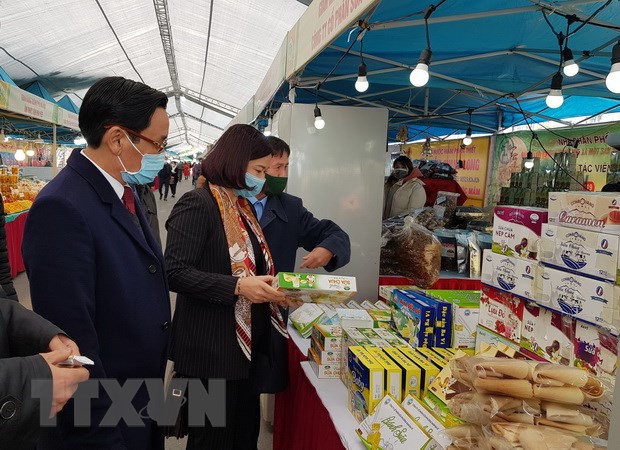 Society
Society


|
| People visit a trade fair displaying One Commune, One Product (OCOP) Products and other specialties of southern provinces held in Hà Nội late in December last year. VNA/VNS Photo Phương Anh |
Tố Như
HÀ NỘI — Hà Nội authorities plan to accelerate trade promotion to drive 'One Commune, One Product' (OCOP) product consumption domestically and for export, said Chu Phú Mỹ, Director of Hà Nội Department of Agriculture and Rural Development.
He said doing so would be vital to improving the lives of rural people.
Đỗ Thị Kinh Thông, director of Kim Thông Trade, service, tourism, import and export Cooperative, said in the past, few people knew about the co-operative’s products.
However, after being certified for OCOP and supported by authorities in terms of communication work, they have won the trust of many consumers who are willing to use the products.
“When our new products are brought to the market, authorities support the co-operative to introduce them at conferences and fairs. Thereby, many retail stores and those selling safe food as well as supermarkets want to sign contracts on product consumption.”
“We expect to soon approach and bring products into major supermarket channels in Việt Nam,” Thông said.
The co-operative is aiming to have their peanuts labelled with five stars - the highest quality certification of the OCOP programme - and export them.
To achieve this, along with the preparation of high-quality raw material areas, the co-operative is aiming to satisfy the standards of import markets, especially choosy ones.
“Currently, the material area of the co-operative is planted in Chanh Thôn Village, Phú Xuyên District's Nam Tiến Commune. We plan to set up a material area spanning several hundred hectares to build safe peanut growing areas in Việt Nam, especially in Phú Xuyên District, where our workshop is located,” Thông said.
Nguyễn Văn Thiêng, head of Đông Anh District’s Economic Office, said in 2019-2020, the district certified more than 100 products as OCOP and elevated the rank for another six.
The OCOP programme is effective, he said.
The programme has helped motivate OCOP participants to focus on building high-quality products, ensuring safety, and continuing to affirm the brand of OCOP products.
With nearly 1,000 products certified as meeting OCOP standards, equivalent to 35.52 per cent of total OCOP products in the country, Hà Nội is one of the leading localities in implementing the programme.
To bring OCOP products to consumers, it is necessary to hold small-scale trade promotion fairs specialised in the OCOP products of a district or locality, according to Thông.
“The smaller the trade fair is, the faster products will reach the market,” she said.
To enhance the effectiveness of OCOP products after receiving certification, Thiêng said it was a must to enhance the quality of the products.
More favourable policies should be issued to support participants in building brands and to meet the standards of not only Việt Nam but also the region and world.
Nguyễn Văn Chí, Deputy Chief of the Hà Nội Office of New Rural Development Programme Coordination, said the development of OCOP products still faced many difficulties.
Products tend to be made on a small scale and most of the labourers have not been professionally trained, he said.
Chí also said the market for many of the products is not stable while many products are mainly in a rudimentary form.
To remove obstacles for OCOP products, the department wants municipal authorities to create favourable conditions for producers who participate in the programme, particularly on branding and certification, according to Mỹ.
Over the next five years, Hà Nội hopes to have at least 400 products certified as meeting the OCOP standards each year. — VNS




